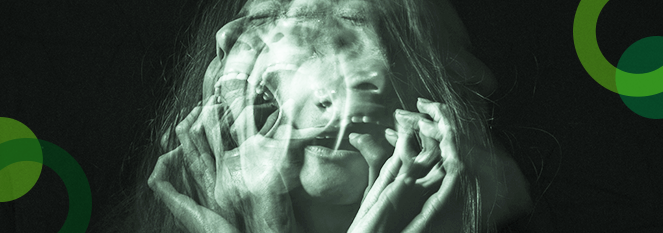Overview
- Bipolar disorder, also known as manic depression, is a mental illness that causes severe mood changes such as emotional highs (mania or hypomania) and lows (depression).
- When you’re depressed, you may feel sad and lose interest in most activities. When your mood shifts to mania or hypomania, you may feel energetic. These mood swings can affect your sleep, energy, behavior, and thinking ability.
- Episodes of mood swings happen rarely. Most people suffer from emotional symptoms during episodes, and some may not experience any.
- You can handle your mood swings and other symptoms with bipolar disorder treatment that includes medication and psychological counseling.


Key symptoms and signs of bipolar disorder are:
- An episode of mania or a severe elevated mood
- Depression or low mood episodes
Though bipolar disorder doesn't have a cure, many treatments can be effective. They can help you to manage mood episodes that not only improve your symptoms but your quality of life as well.
Types of Bipolar Disorder
There are three major types of bipolar disorder: bipolar I, bipolar II, and cyclothymia.
- Bipolar I
Bipolar I is defined by the presence of at least one manic episode. You may have hypomanic episodes that are less severe than manic episodes or major depressive episodes. This type of bipolar disorder equally affects people of all age groups.
- Bipolar II
In bipolar II, people experience one major depressive episode that lasts for at least two weeks. They also have at least one hypomanic episode that lasts nearly four days.
- Cyclothymia
In this type of bipolar disorder, people have episodes of hypomania and depression. The symptoms of these episodes are less severe and shorter than mania and depression. Many people experience no mood symptoms for one or two months.
Other Types
These include bipolar and related disorders caused by certain drugs, alcohol, or a medical condition, i.e., Cushing's disease, stroke, or multiple sclerosis. Bipolar II disorder isn't a milder form of bipolar disorder but a different diagnosis. However, manic episodes of bipolar I disorder can be severe. Therefore, people with bipolar II disorder can be depressed for long time periods, which can cause impairment.
Bipolar Disorder Diagnosis
Your evaluation to diagnose bipolar disorder may include:
- Physical exam
- Psychiatric assessment
- Mood charting
Your doctor may conduct a physical exam or lab tests to figure out any medical problem that could be causing bipolar personality disorder.
Your doctor may recommend you psychiatric help, who will talk about your thoughts, feelings, and behavior patterns. You may also require to fill out a questionnaire.
You may be required to note on daily basis your moods, sleep patterns, or other factors that could help with diagnosing and getting the right treatment.
Bipolar Disorder Symptoms
In bipolar disorder, the episodes of high and low moods aren't according to a specific pattern. Some may experience the same mood state several times before moving to the opposite mood swings. These episodes can last for weeks, months, and years.
Symptoms of mania (“the highs”) include:
- Excessive happiness and excitement
- Restlessness
- Poor concertation
- Rapid speech
- Drug and alcohol abuse
- Increased energy
- Less sleep
During depressive periods (“the lows”), you may experience:
- Sadness
- Loss of energy
- Irritability
- Insomnia
- Suicide attempt
- Inability to feel happiness
- Feeling of hopelessness
Bipolar Disorder Causes
Several factors together are causes of bipolar disorder, including:
| Causes | What it Entails |
| Genetics | There are more chances of developing bipolar disorder if any of your family members have it. |
| Stress | A stressful life event such as death, illness, or financial problems can trigger a manic or depressive episode. |
| Brain structure and function | Your brain structure may increase the risk of bipolar disorder development. |
| Environmental factors | Extreme stress, traumatic experiences, and physical illness can also be the causes of bipolar disorder. |
Bipolar Disorder Treatment
Several bipolar disorder treatments can help you manage bipolar disorder. These involve medication, counseling, and change in lifestyle.
Medications
Recommended medications for effective treatment are:
- Mood stabilizers
- Antipsychotics
- Antidepressant-antipsychotics
Psychotherapy
Some recommended therapies for bipolar disorder treatment include:
- Cognitive-behavioral therapy (CBT)
- Psychoeducation
- Interpersonal and social rhythm therapy
Other Treatment Options
Some people may find the following treatments helpful in managing bipolar symptoms, such as:
- Electroconvulsive therapy (ECT)
- Transcranial magnetic stimulation (TMS)
- Light therapy
Exercise helps improve self-image and releases specific chemicals in the brain that trigger positive feelings.

The key difference between bipolar disorder and depression is the appearance of manic episodes. Depression alone is not sufficient to diagnose a person with bipolar disorder. However, one manic episode is enough to diagnose bipolar disorder.
Bipolar disorder is a severe mental illness that can lead to substance abuse, violence, or suicide if left untreated. If you or your loved one suffers from bipolar disorder, consult a doctor immediately for a better quality of life.
A normal life for a bipolar disorder diagnosed person can be achieved with a commitment from the affected person as well as friends and family members. Getting consistent, quality care is one of the key challenges in bipolar disorder treatment. Moreover, a sense of community keeps a person away from feeling isolated or helpless.
There is no cure for bipolar disorder. But with behavior therapy and stabilizers and bipolar medicines, you can live a normal life and control the illness.
Bipolar disorder can develop in a person between 15 and 19 years of age. The second most common age group is 20-24 years. Some people diagnosed with regular major depression may also have bipolar disorder, and go on to develop their first manic episode when older than 50 years.
Join Our Newsletter Now
Subscribe to get information about Omni Help
